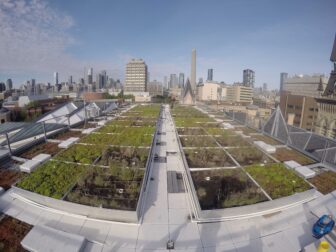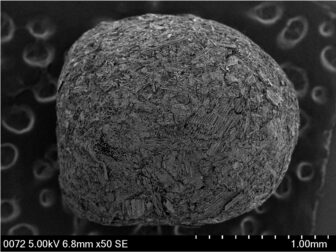
This University of Toronto green roof provides research opportunities to undergraduates as a part of the Green Roof Innovation Testing (GRIT) Laboratory. Image: Wenxi Liao
By Daniel Schoenherr
A new way to boost plant growth discovered by University of Toronto researchers could make it easier to cool buildings with rooftop gardens.
It involves biochar, a mix of carbon and ash that is added to soil to prevent erosion, nutrient loss, and water loss. Biochar has played a critical role for decades in forest management and agriculture projects.
One of the tradeoffs for conventional biochar is it can inhibit plant growth.
“Biochar isn’t too common in the market,” said Nate Griswold, president of Inhabitect, a Traverse City urban landscaping company focusing on the design and construction of green roofs. Those are rooftop plant beds that naturally regulate building temperature and control water runoff.
Conventional biochar can be used in green roofs, but it is difficult to obtain enough of the right type for a project. “Supplier A may have the product we need, but Supplier B will often have something different,” said Griswold.
A recent University of Toronto study reported on plants grown in a greenhouse using different types of biochar, including a granulated variant with a larger particle size.
“The results of the study are unprecedented,” said the study’s author Wenxi Liao. Plants grown with granulated biochar grew 50 to 60 percent larger than those grown with conventional biochar. They also flowered about two weeks earlier.

An electron microscope image of a granulated biochar particle, about as wide as the tip of a crayon. Image: Wenxi Liao
A significant advantage is that the granulated biochar’s low density makes it lighter, according to the study. This could allow for larger green roofs, as their size is restricted by weight for structural reasons.
Research like this is bringing green roofs closer to universal acceptance for consumers, Griswold said. “Year after year, the industry is growing by multiple times.”
Landscaping companies have already contacted the researchers as they look to incorporate granulated biochar into their soil products, Liao said. The substance is affordable and easy to make, but will take time to begin commercial production.
Despite the promising results, the team is alone in their research and doesn’t have a complete picture of what is going on. Liao wants to find out why the granulated biochar boosted plant performance.
Granulated biochar has its downsides, holding less water than its conventional counterpart. “More research is needed to increase its benefits,” she said.
The team’s discoveries will help return plants to urban spaces, said Liao. Natural landscapes across the world have been converted into cities, and green roofs promote pollination and reduce local temperatures.
“There is a really brilliant future for green roofs,” Liao said.